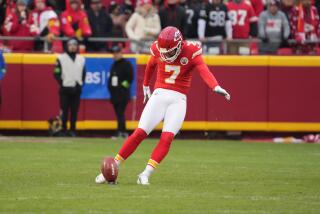On The Spot
PARIS — Here are a few facts to keep in mind while chilling the wine, preparing the pate and contemplating today’s World Cup final between Brazil and France at Stade de France in Saint-Denis:
* A soccer goal is 24 feet wide by 8 feet high.
* The average goalkeeper is about 6 feet 2, give or take an inch or two.
* The penalty spot is exactly 12 yards from the center of the net.
* International players such as Brazil’s Roberto Carlos can, with a very short run-up, strike the ball at speeds of 80 mph or more.
All of which leads to the following question: Why on earth should anyone fail to score when a tied game goes to the penalty kick shootout? Indeed, why do coaches keep calling it “a lottery” when scoring should be so easy?
Here’s the answer: It’s not as simple as it seems.
Try directing a ball accurately, let alone hitting it with power, when your knees are suddenly jelly. Try deciding, literally on the spot, whether to shoot left or right, high or low, when a glaring goalkeeper is dancing on the line and the crowd is baying in the background.
Even the bravest of souls gets stage fright.
In golf it’s called “the yips.” In soccer, it’s called torture.
“At the end of the day, it’s a mental thing,” England’s Coach Glenn Hoddle said. “It’s about how you feel at that very moment when you’re taking that kick.”
England three times has been knocked out on penalty shots in the latter stages of major tournaments.
“It’s difficult to put your finger on a reason,” Hoddle said. “But the psychological side [nerves] and the past [history of failure] are definitely part of it.”
On the other hand, as one fan said in Rome after Italy had been bounced out of this tournament in a shootout, it might just be luck.
“Penalties don’t mean anything,” he said. “They’re like traffic lights. You never know when they’re going to change and go against you.”
That may be a sensible view, but it doesn’t make the players who miss feel any better. Those who have failed when the game was on the line--and they include some of the biggest names in the sport--will tell you they wished the ground would simply have opened up and swallowed them after their miscues.
Soccer is a team sport in which one player’s mistake can often be corrected by another, but penalty kicks are strictly one-on-one battles, with the eyes of the world fixed on both kicker and keeper. For the goalkeeper, it’s marginally less nerve-racking. He can only be the hero, not the goat.
“In a shootout, you must forget everything else and think only of stopping the shot,” Argentine goalkeeper Carlos Roa said. “You are not expected to stop it, but if you do, you can win.”
Just as Roa did when he foiled England’s David Batty in the quarterfinals at Saint-Etienne.
Just as France’s Fabien Barthez did when he blocked the shot by Italy’s Demetrio Albertini in the quarterfinals at Saint-Denis.
Just as Brazil’s Taffarel did when he hurled himself to his right to deny the Netherlands’ Ronald de Boer in the semifinals at Marseille.
But Barthez and Taffarel will be only too happy to see today’s game settled long before it comes to penalty kicks. Both teams feel that way.
The French were knocked out of the 1996 European Championship semifinals on penalties by the Czech Republic in Manchester, England. The Brazilians remember 1986, when they lost on penalties to France in the quarterfinals in Guadalajara, Mexico. Two players who missed penalty kicks that day will be in Stade de France today--Zico, now Brazil’s assistant coach, and Michel Platini, chairman of France 98.
Zico missed his penalty kick during regulation play; Platini lifted his over the crossbar during the shootout. Platini, not surprisingly, is not a lover of using penalty kicks to settle tie games.
“My philosophy of football is to score a goal, not win on penalty kicks,” he said. “I would do away with the 30-minute limit altogether and play on until somebody scores.”
The rules allow for half an hour of extra time, during which the first goal scored--the so-called “golden goal”--wins the game. If it remains tied, the teams go to penalty kicks, which were first used in the World Cup in Spain in 1982.
The “golden goal” was the idea of incoming FIFA President Sepp Blatter. The name itself is nothing more than a nonsensical public relations device aimed at avoiding the term “sudden death,” but the concept is reasonably sound. Anything to avoid penalty shots.
Now, however, FIFA is talking about tinkering with the golden goal. One idea is to play the full 30 minutes of overtime. If the game remains tied, the winner is the team that scored first in overtime. If neither team scored, penalty kicks come into play.
The golden goal is not universally popular. Even German striker Oliver Bierhoff, whose overtime goal mere minutes into the Euro ’96 final sunk the Czech Republic, doesn’t like it. The goal made him a hero and earned him a small fortune in endorsements, but that doesn’t matter, he said.
“I don’t think they should use it anymore,” he said. “I think it is a shame that teams [that fall behind] don’t get the time to get a goal back in extra time.”
The golden goal does cause an abrupt ending to a game, but is that any worse than the anguish penalty kicks cause?
Italy’s Roberto Baggio suffered for four years after his miscue at the Rose Bowl in 1994 had handed Brazil the championship. Only when he scored from the spot against Chile in this tournament was the nightmare erased, or at least shelved.
“I hope not to go through shootouts again,” he said at the time.
Then the Italians lost to France on penalty shots and even though Baggio scored, the impact was the same.
“I would have preferred to lose in open play or, failing that, on a golden goal,” he said. “Penalties are the worst way of all to lose.”
Said luckless Luigi Di Biagio, whose kick slammed against the French crossbar, ending Italy’s hopes: “It hardly seems fair to lose the World Cup in this way, and to feel in some way personally responsible is a dreadful feeling.”
England’s Gareth Southgate was the player on the rack in Euro ’96. His miss against Germany in the semifinals knocked England out of the tournament.
“I feel that I’ve let the whole country down,” he said immediately after the game. “It’s an awful feeling.
“Now all I will be remembered for is being the man who missed the crucial penalty.”
And that is the real reason so many players dislike penalty kicks as game deciders. An entire career can be ruined, at least in their eyes, by one flubbed shot.
It might be too great a penalty to pay.
Of course, the alternatives being bandied about are no better. Pele, for example, favors the Major League Soccer-style “moving shootout” from 35 yards out.
“This is exciting and the American public enjoys it,” he said. “The problem with indefinite extra time is you don’t know how long it will last and that creates difficulty for television. I think the shootout system has more emotion.”
In an interview with England’s Daily Telegraph, Pele on Friday proposed an even more revolutionary idea.
He believes the winner of a tied game should be determined by which team had lost fewer earlier-round matches, then by goal differential over the previous games, then by the fewest number of red and yellow cards.
“I think this would seem fair and credible to everybody,” he said. “It would encourage all teams to be positive, not to commit fouls and not to shut up the game in the hope that they will win the lottery of penalties.”
There’s that word again--”lottery.”
Fortunately, Pele also offered some hope that today’s match--unlike the 1994 final--will not come to that.
“I think it will be decided in 90 minutes,” he said.
And the winner?
“Brazil, of course.”






